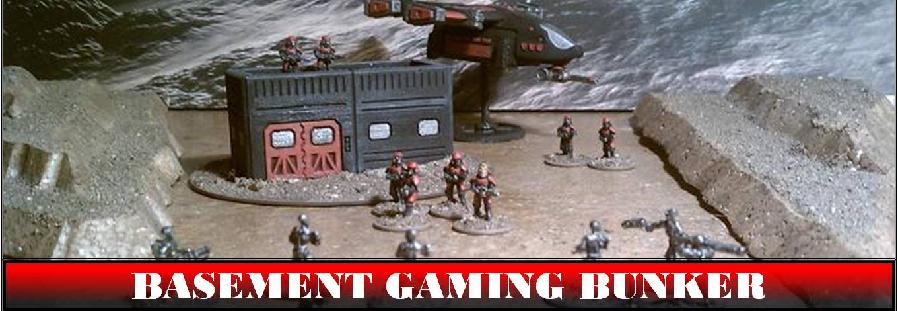Needless to say, the online communities hosted some lively debates on the subject. As with most internet arguments, people jumped to conclusions without exploring the details. Personally, I'd rather have all the facts before I weigh in, so I dug a bit deeper into exactly what had to be removed. See here for a complete list.
Normally I err on the side of the copyright holder, but some of these takedowns were absolutely silly. Currently "supported" (stocked) games such as Blood Bowl, Necromunda, and Five Armies... this I understand. Abandoned minigames like Brewhouse Bash, The Lost Patrol, Doom of the Eldar, etc... This seemed harsh as these never received more than an initial release from GW, but they are still part of the 40k universe and its IP. So I can forgive this with a simple rolling of my eyes.
But also on that list are Judge Dredd, Warlock, Rogue Trooper... all games from the early 80s, when GW was an independent games publisher and not dedicated to the Warhammer hobbies. These games haven't been produced in decades, aren't supported, aren't announced as future releases... and GW feels the need to "protect" these games? After this many years, I don't understand what they are trying to accomplish. Their legal department seems to be operating without any real guidelines, boundaries, or common sense. With the GW studio falling incredibly silent over the past few years, the company has very little interaction with the general public (especially in North America, where hobby centers are few and far between). When the only "voice" or "face" on a company is its legal department demanding takedowns of fan-created content for 30-year-old games, that company's reputation should suffer accordingly.
GW needs to quickly change into a company that is far more supportive of its veteran (ie: long-term spending) gamers. I would offer the following:
1 - Developers' Kit. Buried deeply within their website are their personal-use guidelines and disclaimer requirements. These are the disclaimers you see on major message boards, FTW/BOLS downloads, etc. If I was a kid entering the hobby today, wanting to start a blog, I'm not sure how easily I would find this information.
GW needs a PROMINENT link on their main website - something like "developers' resources," "fan content creation," or "blogger toolkit." On this page should be plain-English guidelines for how to post your disclaimers, what is forbidden by copyright and what isn't, etc. They could even devise a set of "public domain" logos that fans could put on their homemade content. This would keep fanmade content from being "mistaken" for official works, and show tremendous support to their long-term gamers. They could even host a database of current fan websites - it wouldn't be as good as an official forum, but it would be something.
2 - Release of abandoned games. Those 1970s-1980s games that aren't related to Warhammer, 40k, or LOTR? Release them to the public. They aren't making money off of them, nor do they have the manpower or resources to try to profit from them today. They should simply have a "History of GW" page on their website listing Judge Dredd, Warlock, Dark Futures, Dr. Who, and their other "abandonware" properties and their release years. Collectors could use this information to find these games on the secondhand market, and those who still play them would be free to develop their own resources (as was on BGG until yesterday).
3 - Release of out-of-publication WFB/40k games. Awhile back, GW released Battle For Armageddon and Chaos Attack as PDFs. Why not do this with all those one-shot games? Brewhouse Bash, Doom of the Eldar, Advanced Space Crusade, Advanced Heroquest... the list goes on. These games are either print-and-play, or are rules that could be used with current-line miniatures. They could even do quickie stories about the mini games... such as how to use modern WFB miniatures with your downloaded Advanced Heroquest rules, missions, and counters. A little work with publications they already possess could easily sell a few more current models.
GW could be very clever with these games, just as many of their customers have been in the past. "Heading to a friend's place for the weekend, but can't take your 40k army? Just take a few Tyranid Warriors and Space Marine Scouts with you, and introduce them to Advanced Space Crusade. Maybe you'll find a new permanent opponent!" Many veteran gamers were introduced to GW by Space Hulk, Heroquest, Space Crusade, etc. There's no reason they couldn't do that with another generation of gamers... just using a slightly modernized distribution model.
In the case of the print-and-plays... these should only be released if Fantasy Flight has decided completely against selling them. Print-and-play would also work great for the old White Dwarf card sections. In fact, why not release as many of those as possible? Some of the scenic bits were very nice. They might be enough to keep beginners around long enough to actually buy Citadel terrain.
These steps would clearly define GW's level of IP protection, open the door to former customers who have walked away because of their legal practices, and expand their potential customer base by using current veterans as marketing representatives. What do they have to lose, other than a few weeks at the scanner and blogging terminal?
